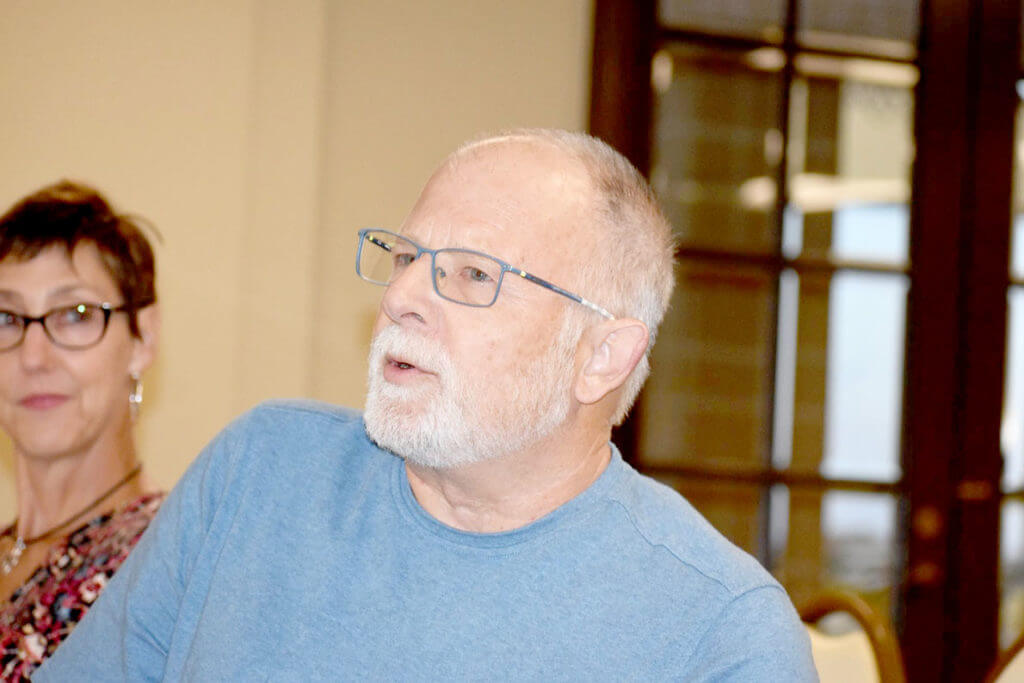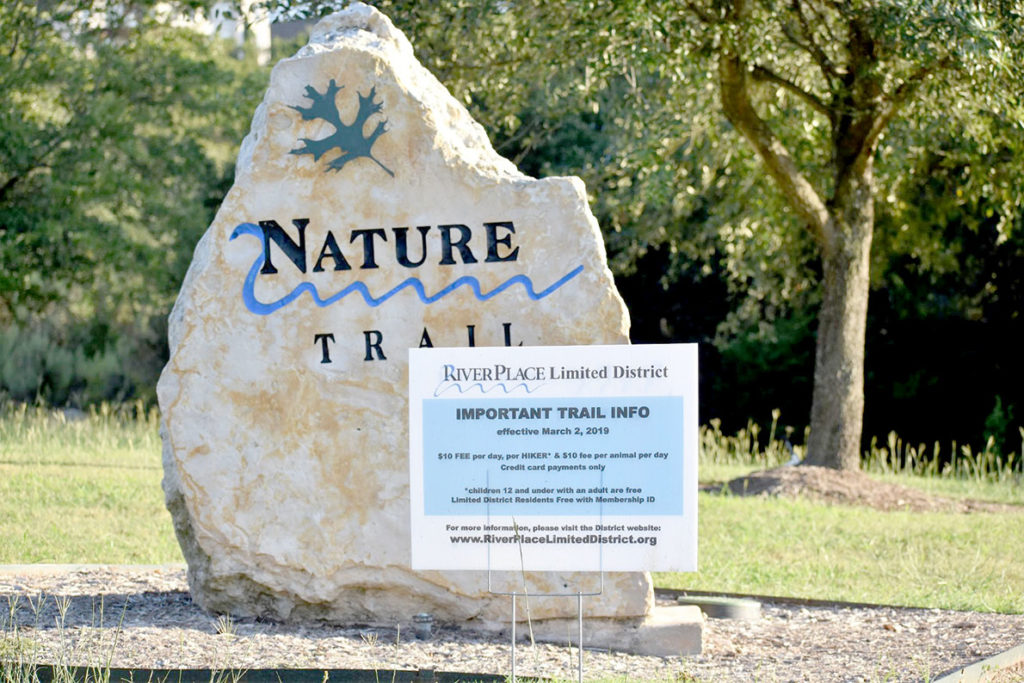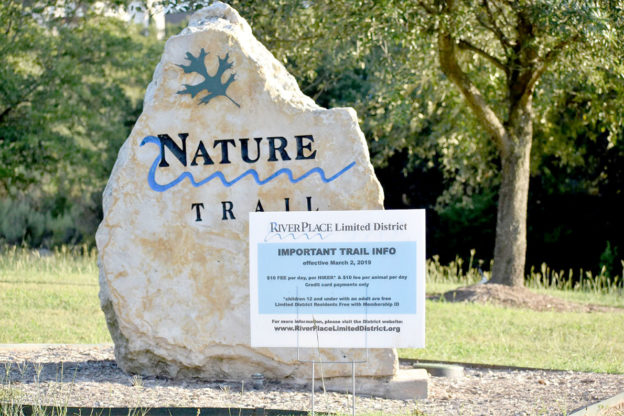
By LESLEE BASSMAN, Four Points News
Introduced as a River Place Limited District proposal more than seven months ago, a fee imposed on visitors and pets to the River Place Nature Trail has been ripe with controversy ever since. Whereas the fee implementation brought cheers from some residents seeking to make their streets safer from the vehicles crowding and endangering the subdivision’s roadways on weekends as well as raise funds for the trail’s maintenance, the new process caused angst for many outside users and non-District residents, neighbors who can see the popular paths but have suddenly become limited in their use.
Now, a new claim by the Texas Parks and Wildlife Department may put the kibosh on the charge for good but residents have had to rely on their own digging or the media for information.
A bit of history
In March, the District instituted a $10 fee per person — ages 13 years old and up — and per pet to access the nature trail for those individuals living outside of the District’s borders. District residents, who pay District taxes, can access the site at no charge if they present a Resident Card while non-District residents living in River Place have the option to purchase a $400 annual trail pass. The trail is free to all users from 10 a.m.-2 p.m., Mon.-Fri., excluding holidays.
The River Place Limited District was created following the city of Austin’s annexation of the area within the River Place Municipal Utility District’s borders in late 2017. It manages the community’s parks and recreational facilities including its tennis courts, soccer fields, playgrounds, pavilions and nature trail,as well as oversees single stream recycling and solid waste disposal.
Texas Parks and Wildlife Department requests District halt fee

In a July 23 correspondence from TPWD Recreation Grants Branch Director Dana Lagarde to District president Scott Crosby, the agency requested the fee be halted “immediately” as violative of a $500,000 state grant that the then-MUD received in 2001 and used to develop the Woodlands Park and its trail for public recreation. As a requirement of accepting the grant, the document provided the group can’t discriminate who can use the trail on the basis of their residency except “to the extent that reasonable differences in admission and other fees may be maintained on the basis of residence.” Additionally, fees charged to nonresidents can’t be greater than twice the fees charged to residents and, if there’s no charge for residents, a nonresident fee can’t exceed the fees charged to residents “at comparable state or local public facilities,” the document stated.
However, the agency offered the district an opportunity to discuss a fee that is acceptable under the terms of the grant, acknowledging that “fees are sometimes required in order to maintain a quality recreation facility.”
The Limited District responds
An Aug. 6 correspondence from the Limited District’s attorney, Zachariah Evans of McGinnis Lochridge, offered data showing the District incurred significant costs of its own, as a former MUD, to construct the trail — including more than $250,000 of capital expenses for a second phase of the project. He said trail donations don’t cover the hike’s maintenance expenses.
Evans stated the District’s Board of Directors implemented the fee only after months of deliberations spanning several public meetings and officials followed a state manual to determine what a reasonable fee for the trail usage should be.
“For reference, the City of Austin’s Emma Long Park, which is the closest public park in proximity to the District, charges $10 per day, Friday through Saturday and holidays; $5 per day, Monday through Thursday; and $1 to walk in or bike in,” he stated in the correspondence.
In contrast, Evans stated the District provides free access to its trail for the vast majority of the time, charging a fee only during peak usage hours on weekends and holidays.
However, Chuck Reynolds, who lives in the non-Limited District portion of River Place and opposes the trail fees, disagrees with the District’s comparison of the two western Travis County parks, given Emma Long’s larger size, access to the lake, overnight camping and accessibility to bike trails and other facilities.
According to the city of Austin’s website, the fees charged to access Emma Long are per vehicle and not per person or pet, and Reynolds pointed out the Turkey Creek Trail, adjacent to Emma Long, can be accessed for free.
Reynolds also said the cost of manning the trail in order to charge admission “has exceeded the revenue (the District has) generated,” so the process doesn’t provide any additional revenue for maintaining the park “but only serves to make it unreasonably expensive for average Austin residents who don’t live in the River Place Limited District.”
Residents frustrated by lack of information
During the Limited District’s Sept. 24 board meeting, Reynolds asked why residents haven’t heard anything publicly from the group pertaining to the TPWD issue.
“I don’t think there’s going to be much discussion about that,” Crosby said. “We are conferring with our attorneys (when) dealing with Texas Parks and Wildlife.”
River Place resident Paul Spring expressed his frustration with the District and the River Place Homeowners Association, and said the groups need to be “transparent” since the matter hasn’t been openly discussed yet. He noted the board and HOA have conducted several meetings since TPWD sent out its letter.
“The trail use is a major initiative of this group and we’ve heard nothing” Spring said. “That, just in general, makes people concerned and suspicious. Beyond that, the notion that both the issue and the solution to that issue are being done privately, doesn’t feel like it’s really in the spirit of this group.”
Spring, who lives outside the Limited District, said he’s been following the trail fee issue for quite some time.
“My concern from the beginning is that this is a resource that is not privately owned by the community,” he said, adding the board should allow access to all trail users. “They are the stewards of it.”
Calling the fee “excessive,” he said the District’s “real concern” is to limit the amount of people entering the community.
“It’s a resource that should be shared with other people,” Spring said of the trail. “I’m very concerned about the precedent this may set with other developments and communities within Austin. Folks are looking at this and, if they can say, ‘Oh, this (trail) is ours, not yours,’ they will.”
At the request of its attorney, the board met in an executive session to get an update on the matter, and Crosby said members won’t be reporting on the issue until an agreement is reached with TPWD.
“We are working with (TPWD) and that’s about as much as I can say,” he said.
Evans told Four Points News he is not authorized to comment on behalf of the District’s Board.
The latest
Currently, TPWD is in the process of scheduling a site visit to the trail as well as a meeting between TPWD and District officials, TPWD Press Officer Aubry Buzek said Sept. 25. However, she said TPWD lacks “an independent authority to force the District to cancel or change the fee.” And, although the agency can’t assess penalties and paying back the grant isn’t an option for the District, she said there are other processes or avenues for action when grant recipients don’t comply with the grant’s terms and conditions. Buzek said TPWD is “currently in the first step of this process which is to resolve the issue via mutual agreement.”
“TPWD expects the District to stop charging the $10 fee while TPWD and the District work together to find a management solution that is consistent with the terms of the grant,” Buzek said.



